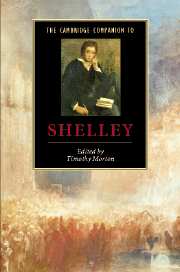10 - Nature and culture
from Part III - Ideas, beliefs, affiliations
Published online by Cambridge University Press: 28 January 2007
Summary
Within you without you
'And the time will come when you see we're all one / And life flows on within you and without you.' Thus concludes George Harrison's song 'Within You Without You'. 'Nature' and 'culture' are often opposed to each other. We commonly talk about the difference between 'nature' and 'nurture'. In Shakespeare's The Tempest, Prospero calls Caliban the slave a devil on whose nature nurture could never stick (4.1.188-9). Nature and culture, however, are not necessarily as different from one another as the colonialist Prospero thinks. For example, 'culture' can mean the growth of a plant, or of bacteria in a laboratory, or 'cultivation', as in 'agriculture'. Rather than a chasm, it is as if there were a loose and slippery continuity between the two terms.
For Percy Shelley, nature and culture were coterminous. In the antihomophobic essay 'A Discourse on the Manners of the Ancient Greeks Relative to the Subject of Love', he puts it succinctly: 'Man is in his wildest state a social being' (Pr 220). A Defence of Poetry is as much a biological treatise as it is a poetic and philosophical one, and life and language turn out to be deeply intertwined within it. The essay begins with a strong thesis on the organic, embodied nature of consciousness. Shelley advocates an anti-dualist idea of the mind as embedded in nature.
- Type
- Chapter
- Information
- The Cambridge Companion to Shelley , pp. 185 - 207Publisher: Cambridge University PressPrint publication year: 2006
- 4
- Cited by

